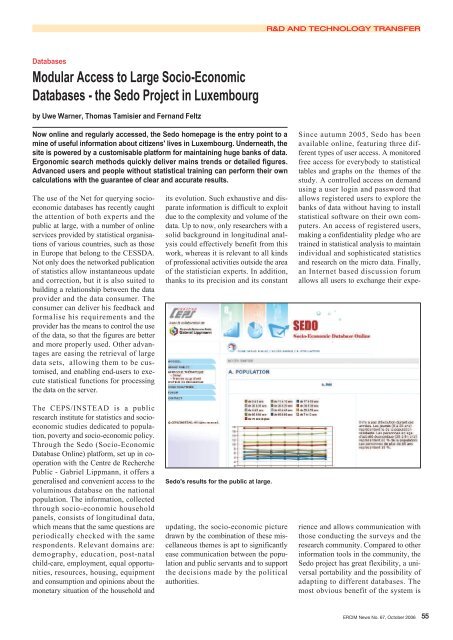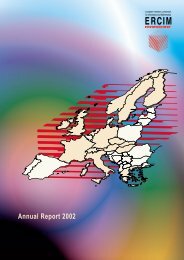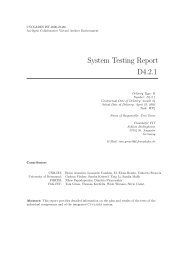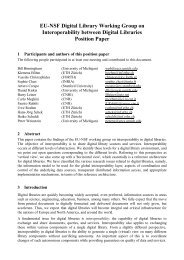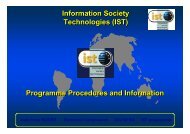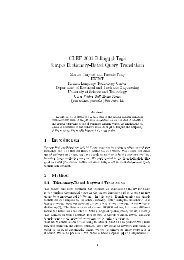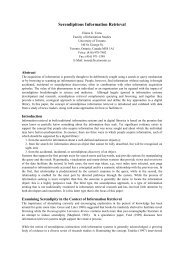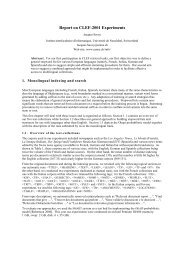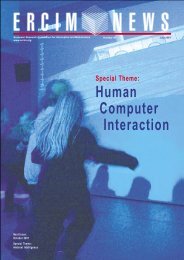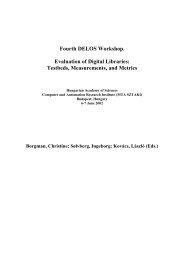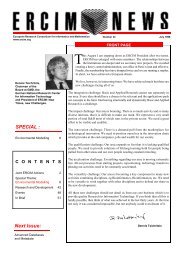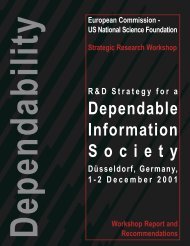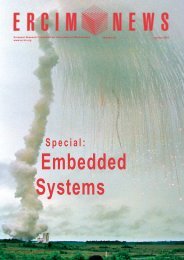Towards a Platform for Widespread Embedded Intelligence - ERCIM
Towards a Platform for Widespread Embedded Intelligence - ERCIM
Towards a Platform for Widespread Embedded Intelligence - ERCIM
You also want an ePaper? Increase the reach of your titles
YUMPU automatically turns print PDFs into web optimized ePapers that Google loves.
Databases<br />
Modular Access to Large Socio-Economic<br />
Databases - the Sedo Project in Luxembourg<br />
by Uwe Warner, Thomas Tamisier and Fernand Feltz<br />
Now online and regularly accessed, the Sedo homepage is the entry point to a<br />
mine of useful in<strong>for</strong>mation about citizens' lives in Luxembourg. Underneath, the<br />
site is powered by a customisable plat<strong>for</strong>m <strong>for</strong> maintaining huge banks of data.<br />
Ergonomic search methods quickly deliver mains trends or detailed figures.<br />
Advanced users and people without statistical training can per<strong>for</strong>m their own<br />
calculations with the guarantee of clear and accurate results.<br />
The use of the Net <strong>for</strong> querying socioeconomic<br />
databases has recently caught<br />
the attention of both experts and the<br />
public at large, with a number of online<br />
services provided by statistical organisations<br />
of various countries, such as those<br />
in Europe that belong to the CESSDA.<br />
Not only does the networked publication<br />
of statistics allow instantaneous update<br />
and correction, but it is also suited to<br />
building a relationship between the data<br />
provider and the data consumer. The<br />
consumer can deliver his feedback and<br />
<strong>for</strong>malise his requirements and the<br />
provider has the means to control the use<br />
of the data, so that the figures are better<br />
and more properly used. Other advantages<br />
are easing the retrieval of large<br />
data sets, allowing them to be customised,<br />
and enabling end-users to execute<br />
statistical functions <strong>for</strong> processing<br />
the data on the server.<br />
The CEPS/INSTEAD is a public<br />
research institute <strong>for</strong> statistics and socioeconomic<br />
studies dedicated to population,<br />
poverty and socio-economic policy.<br />
Through the Sedo (Socio-Economic<br />
Database Online) plat<strong>for</strong>m, set up in cooperation<br />
with the Centre de Recherche<br />
Public - Gabriel Lippmann, it offers a<br />
generalised and convenient access to the<br />
voluminous database on the national<br />
population. The in<strong>for</strong>mation, collected<br />
through socio-economic household<br />
panels, consists of longitudinal data,<br />
which means that the same questions are<br />
periodically checked with the same<br />
respondents. Relevant domains are:<br />
demography, education, post-natal<br />
child-care, employment, equal opportunities,<br />
resources, housing, equipment<br />
and consumption and opinions about the<br />
monetary situation of the household and<br />
its evolution. Such exhaustive and disparate<br />
in<strong>for</strong>mation is difficult to exploit<br />
due to the complexity and volume of the<br />
data. Up to now, only researchers with a<br />
solid background in longitudinal analysis<br />
could effectively benefit from this<br />
work, whereas it is relevant to all kinds<br />
of professional activities outside the area<br />
of the statistician experts. In addition,<br />
thanks to its precision and its constant<br />
Sedo's results <strong>for</strong> the public at large.<br />
updating, the socio-economic picture<br />
drawn by the combination of these miscellaneous<br />
themes is apt to significantly<br />
ease communication between the population<br />
and public servants and to support<br />
the decisions made by the political<br />
authorities.<br />
R&D AND TECHNOLOGY TRANSFER<br />
Since autumn 2005, Sedo has been<br />
available online, featuring three different<br />
types of user access. A monitored<br />
free access <strong>for</strong> everybody to statistical<br />
tables and graphs on the themes of the<br />
study. A controlled access on demand<br />
using a user login and password that<br />
allows registered users to explore the<br />
banks of data without having to install<br />
statistical software on their own computers.<br />
An access of registered users,<br />
making a confidentiality pledge who are<br />
trained in statistical analysis to maintain<br />
individual and sophisticated statistics<br />
and research on the micro data. Finally,<br />
an Internet based discussion <strong>for</strong>um<br />
allows all users to exchange their expe-<br />
rience and allows communication with<br />
those conducting the surveys and the<br />
research community. Compared to other<br />
in<strong>for</strong>mation tools in the community, the<br />
Sedo project has great flexibility, a universal<br />
portability and the possibility of<br />
adapting to different databases. The<br />
most obvious benefit of the system is<br />
<strong>ERCIM</strong> News No. 67, October 2006<br />
55


